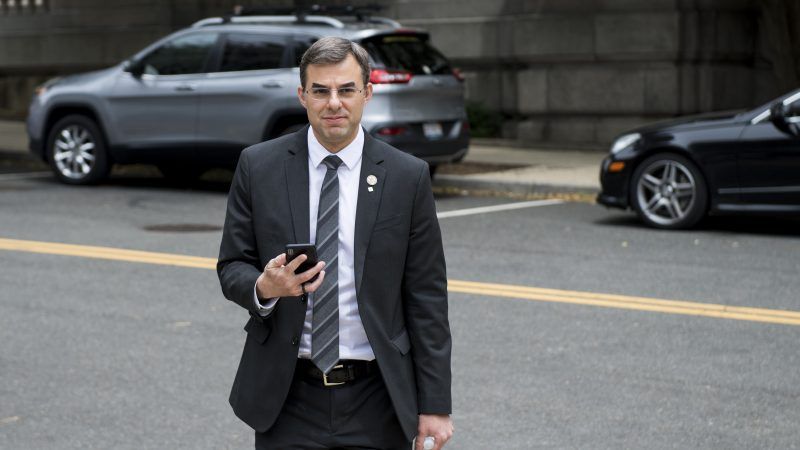Justin Amash Officially Quits House Republicans and Steps Down From Committee Seat
Plus: HHS can't compel prices in drug ads, Robert Kraft dines with Trump, and more…

It's official. Formerly Republican Rep. Justin Amash took another step Monday toward finalizing his breakup with the GOP. "Today, I sent … formal notification that I am withdrawing my membership in the House Republican Conference and, consistent with House rules, resigning from the Committee on Oversight and Reform," the Michigan representative tweeted yesterday.
As a Constitution-first, libertarian-learning anomaly in Congress from the get-go, Amash has become increasingly isolated from other Republicans in the Trump era, though for a while colleagues seemed fine with using Amash as cover to pretend they're still all about limited government. Amash's bridge too far for the party—now completely owned by President Donald Trump—came when he endorsed Trump's impeachment. The once-rosy relationship between Amash and prominent Republicans devolved quickly from there.
In a July 4 op-ed, Amash officially declared his independence from the GOP. "My parents, both immigrants, were Republicans," Amash wrote in The Washington Post. "I supported Republican candidates throughout my early adult life and then successfully ran for office as a Republican. The Republican Party, I believed, stood for limited government, economic freedom and individual liberty—principles that had made the American Dream possible for my family. In recent years, though, I've become disenchanted with party politics and frightened by what I see from it. The two-party system has evolved into an existential threat to American principles and institutions."
Amash concluded by asking others to join him "in rejecting the partisan loyalties and rhetoric that divide and dehumanize us" and "to believe that we can do better than this two-party system—and to work toward it."
In response, Republican leaders began calling for Amash to be removed from his committee position in Congress since he held that position as a Republican. Before they could do that, however, Amash took it upon himself to step down.
In his July 8 letter to House Minority Leader Kevin McCarthy and House Republican Conference Chair Liz Cheney, Amash wrote: "Please accept this letter as formal notification that I am withdrawing my membership in the House Republican Conference, effectively immediately, for the reasons outlined in [the Post] op-ed." He added that he would also be resigning from the Committee on Oversight and Reform.
FREE MINDS
Another unintended consequence of Europe's new data law. Without fail, efforts to regulate the internet in the name of safety seem to end up thwarting actual safety. The latest example: "EU Privacy Laws May Be Hampering Pursuit of Terrorists." From Bloomberg:
When U.S., European and Canadian law enforcement officials claimed success last year in largely obliterating militant group Islamic State's online propaganda network following a two-year operation, it was a public database of domain names that partly helped. In an effort to crack down on websites, blogs, and Twitter accounts that relayed IS propaganda whenever there was an attack, authorities used the internet's WHOIS database to identify about 400 domains hosting the content and registered by IS supporters, resulting in a number of arrests.
But the same work would be much more difficult to do today, according to a European law enforcement official, due to Europe's strict new data privacy rules, the General Data Protection Regulation, which entered into force last May. The WHOIS directory, which previously displayed both technical and personal data related to registered domain names, has been redacted to scrub out names, email addresses and other personal information due to Europe's privacy law.
FREE MARKETS
The government can't force drug companies to disclose prices during TV ads, according to a new ruling from the U.S. District Court for the District of Columbia. The court "ruled that the Department of Health and Human Services exceeded its regulatory authority by seeking to require all drugmakers to include in their television commercials the list price of any drug that costs more than $35 a month. The rule was to take effect this week," notes The New York Times.
QUICK HITS
- Patriots owner Robert Kraft sat at the same table as President Donald Trump at a dinner for the emir of Qatar.
- "Though cable networks and social media now dominate news and advertising, [the Department of] Justice is suddenly trying to micromanage local broadcast markets," complains the Wall Street Journal editorial board.
- A new "enormous and comprehensive" study on marijuana use during pregnancy finds "some increased risk of poor birth outcomes among the cannabis users: most notably an increased risk of premature birth, an increased risk of the infant being small for his or her gestational age, and an increased risk of transfer to the NICU," reports The Atlantic. "These risks were large if not staggering."
- How #MeToo left sex workers behind.
- Just make oral contraceptives available over the counter already…
- Tariffs are causing trouble for Bible-makers.
- Anti-abortion groups are fighting against in vitro fertilization benefits for veterans.


Show Comments (153)